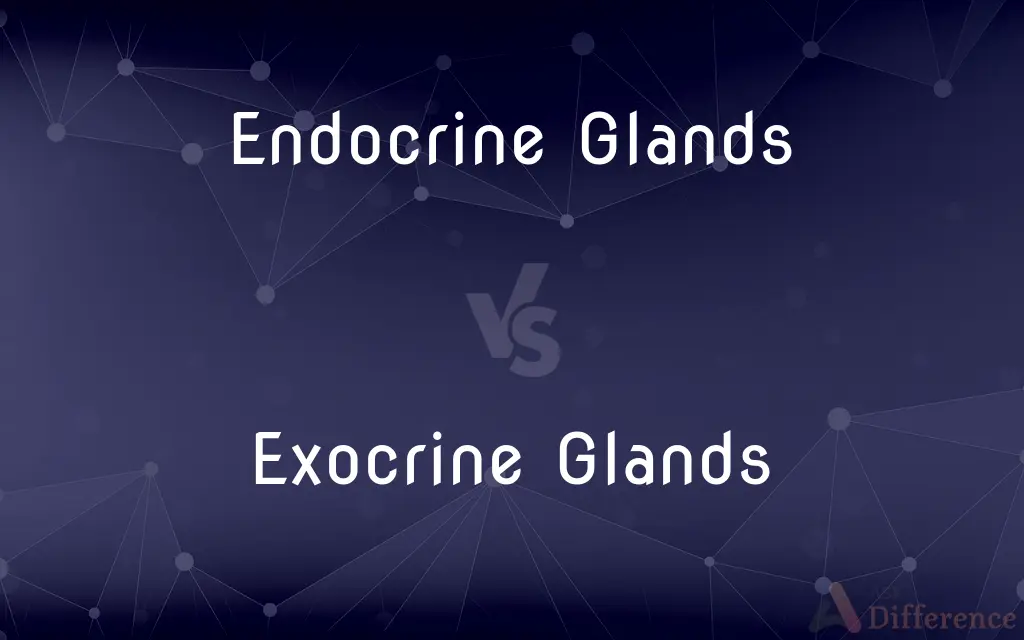Endocrine Glands vs. Exocrine Glands — What's the Difference?
By Tayyaba Rehman — Published on December 8, 2023
Endocrine glands secrete hormones directly into the bloodstream, while exocrine glands release substances through ducts to the body's surface or cavities.

Difference Between Endocrine Glands and Exocrine Glands
Table of Contents
ADVERTISEMENT
Key Differences
Endocrine glands lack ducts and release hormones into the bloodstream, which travel to target organs. In contrast, exocrine glands use ducts to release their products to external or internal body surfaces.
The hormones produced by endocrine glands play a pivotal role in regulating body functions like metabolism, growth, and mood. On the other hand, exocrine glands produce substances like sweat, saliva, and digestive enzymes.
Endocrine glands include the thyroid, pituitary, and adrenal glands, which have a systemic effect. Exocrine glands, such as sweat, salivary, and mammary glands, generally have localized effects.
The secretions from endocrine glands are typically regulatory molecules influencing various physiological processes. In contrast, exocrine glands release functional substances, such as enzymes or lubricants.
Both endocrine and exocrine glands are crucial for homeostasis. While endocrine glands manage long-term processes like growth, exocrine glands handle immediate processes like digestion.
ADVERTISEMENT
Comparison Chart
Secretion Method
Directly into the bloodstream
Through ducts to body's surface or cavities
Product Type
Hormones
Enzymes, sweat, saliva, etc.
Examples
Thyroid, pituitary, adrenal glands
Sweat, salivary, mammary glands
Effect
Systemic, affecting multiple organs
Localized effect
Structural Feature
Lacks ducts
Contains ducts
Compare with Definitions
Endocrine Glands
Internal secretion organs directing physiological processes.
Endocrine glands play a role in balancing our mood and stress responses.
Exocrine Glands
Surface-secreting organs aiding immediate physiological processes.
Exocrine glands in our skin release oils that provide a protective barrier.
Endocrine Glands
Glands that orchestrate body's response to changing conditions.
Endocrine glands ensure homeostasis by adjusting hormonal output as needed.
Exocrine Glands
Organs producing non-hormonal substances for localized effects.
The pancreas, as an exocrine gland, releases digestive enzymes into the small intestine.
Endocrine Glands
Glands that modulate body functions via hormonal secretions.
Dysfunction in endocrine glands can lead to disorders like diabetes or hyperthyroidism.
Exocrine Glands
Glands secreting functional products externally or into cavities.
Exocrine glands, like salivary glands, facilitate digestion by releasing saliva.
Endocrine Glands
Ductless glands releasing hormones into the bloodstream.
The pituitary is one of the major endocrine glands regulating growth and development.
Exocrine Glands
Glands that release substances through ducts.
Exocrine glands, such as sweat glands, help regulate body temperature.
Endocrine Glands
Organs producing regulatory substances for systemic effects.
Endocrine glands, such as the thyroid, influence metabolism and energy utilization.
Exocrine Glands
Duct-bearing glands releasing enzymes, mucous, or fluids.
Mammary glands, a type of exocrine glands, produce milk for offspring.
Common Curiosities
What's the role of endocrine glands in growth?
Endocrine glands release growth hormones that regulate cell growth and division.
Do exocrine glands have ducts?
Yes, exocrine glands release their products through ducts to external or internal body surfaces.
What's the primary function of endocrine glands?
Endocrine glands produce and release hormones that regulate various body functions.
Which gland produces sweat?
Sweat is produced by sweat glands, a type of exocrine gland.
How do hormones from endocrine glands reach their target organs?
Hormones are released into the bloodstream and travel to target organs.
What's a primary function of exocrine glands in the digestive system?
Exocrine glands produce digestive enzymes that break down food.
Are sebaceous glands endocrine or exocrine?
Sebaceous glands are exocrine glands, secreting oils to the skin's surface.
Can a gland be both endocrine and exocrine?
Yes, the pancreas is an example, having both endocrine (insulin production) and exocrine (digestive enzyme production) functions.
What are some products of exocrine glands?
Exocrine glands produce substances like sweat, saliva, milk, and digestive enzymes.
Which gland regulates metabolism?
The thyroid, an endocrine gland, plays a significant role in regulating metabolism.
Which endocrine gland is known as the "master gland"?
The pituitary gland is often referred to as the "master gland" due to its wide-ranging regulatory functions.
How do endocrine glands contribute to homeostasis?
Endocrine glands release hormones that regulate physiological processes, ensuring balance and stability.
Can disorders arise from malfunctioning endocrine glands?
Yes, disorders like diabetes and hyperthyroidism result from endocrine gland dysfunctions.
Do exocrine glands have a role in thermoregulation?
Yes, sweat glands, a type of exocrine gland, help regulate body temperature.
How do exocrine glands differ in secretion from endocrine glands?
Exocrine glands release products through ducts, whereas endocrine glands secrete hormones directly into the bloodstream.
Share Your Discovery

Previous Comparison
Intergenerational Mobility vs. Intragenerational Mobility
Next Comparison
Economic vs. Social InfrastructureAuthor Spotlight
Written by
Tayyaba RehmanTayyaba Rehman is a distinguished writer, currently serving as a primary contributor to askdifference.com. As a researcher in semantics and etymology, Tayyaba's passion for the complexity of languages and their distinctions has found a perfect home on the platform. Tayyaba delves into the intricacies of language, distinguishing between commonly confused words and phrases, thereby providing clarity for readers worldwide.














































